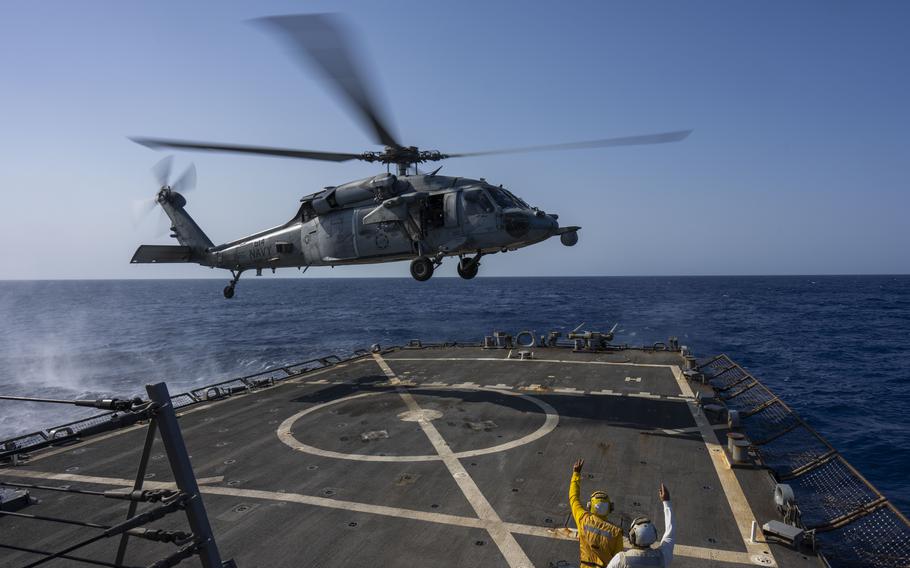
An HSC-7 helicopter lands on the USS Laboon in the Red Sea on June 12, 2024. (Bernat Armangue/AP)
America is at war in the Red Sea. It’s tactically winning and strategically losing.
Seven thousand sailors — the largest naval deployment since World War II — have worked tirelessly to shoot down hundreds of Houthi drones and missiles in defense of maritime trade. Dozens of airstrikes and multiple aircraft carriers have rounded out an epic show of American military might in the region since last year’s announcement of Operation Prosperity Guardian.
Yet all that hardware and people put in harm’s way to defeat Houthi antagonism in the Bab el Mandab Strait has been as effective as killing a swarm of mosquitos with a bazooka.
The U.S. plays a costly game of whack-a-mole, swatting $10,000 Houthi drones with $4 million missiles. This “cost of kill” problem is worsened by radically different definitions of victory between the two sides. While the U.S. mission requires defending every ship from every attack, 5th Fleet Commander Vice Adm. George Wikoff admits “the Houthis have to get lucky once” to score a hit on American forces and celebrate a tremendous propaganda victory.
Despite constant American air raids, the Houthis persist. The vice chair of the United Nations-recognized Yemeni government, now entering its second decade of war with the Houthis, recently observed “the airstrikes, instead of deterring the Houthis, are having the opposite effect.”
The strikes allow the insurgents to portray themselves as the local population’s protectors. More concerningly, the vice chair noted Western operations “are not really effective militarily” because the group is resilient from years of conflict and practiced at hiding their capabilities.
If the U.S. wishes to protect every nautical inch of the same distance as Boston to Miami without an end date, Russia and Iran are happy to keep the Houthis sufficiently supplied to take potshots at American forces forever.
With mounting frustration among the ranks, the temptation to kinetically “fix” the problem through escalation will grow. This would be a strategic disaster.
Moscow, Tehran and Beijing are all eager to see America entangled in another Middle Eastern quagmire. The U.S. rushed a carrier from the Pacific for the current operation, leaving a carrier gap that delighted Beijing and highlighted the opportunity costs of policing the Red Sea.
Any lasting solution, as Wikoff recognizes, is “not going to come [from] the end of a weapons system.” Pressure on Iran, the main Houthi sponsor, will require pragmatic deals with those able to influence Iran. China is an excellent candidate, as it has previously demonstrated its ability to extract guarantees from Iran for Chinese tankers in the strait.
Indeed, China benefits as much from uninterrupted commerce in the Red Sea as nearly anyone else. A combined $280 billion of Chinese imports and exports are estimated to flow through the Bab el Mandab Strait each year, nearly a fifth of all total maritime trade on the route.
All potential sources of leverage should be on the table for negotiations with China. For example, Washington could consider pegging the number of freedom of navigation operations it conducts in the Taiwan Strait to Beijing’s measurable success in leaning on Iran to stop Houthi attacks in the Bab el Mandab Strait. If policymakers in D.C. are reluctant to trade anything of this magnitude for Red Sea shipping, that should be considered a telling admission about the actual importance of the matter to core U.S. national security interests.
Regardless of what China can provide, Washington must also push local powers to fairly share the burden of protecting Red Sea commerce. Bahrain is the only Arab member of the 24-nation Prosperity Guardian coalition. Egypt, whose Suez Canal has suffered steep revenue loss, and Saudi Arabia, still seeking a landmark U.S. defense treaty, are both glaring absences. Without a course change, the U.S. soon faces a no-win set of options: keep up a miserable, Sisyphean task or lash out with a foolhardy escalation.
Similar to the difficult Afghanistan withdrawal, President Joe Biden owes it to his successor to avoid passing on another costly and strategically blind commitment. The president succinctly summarized the senselessness of the current American posture in the Red Sea when he was asked by a reporter earlier this year if the American attacks on Houthi targets were working.
“Well, when you say working, are they stopping the Houthis? No,” he said.
“Are they gonna continue? Yes.”
Both facts remain true: The Houthis show no sign of being deterred, yet the continual American attacks have grown to include runs by vaunted B-2 Spirit bombers.
The clock is ticking for Biden to pivot from kinetic to diplomatic solutions. The inevitable Houthi lucky shot that forces this issue could be in five years or the day after tomorrow. Either way, America is losing the long game in its Red Sea war.
Andrew Jarocki is a Contributing Fellow at Defense Priorities.